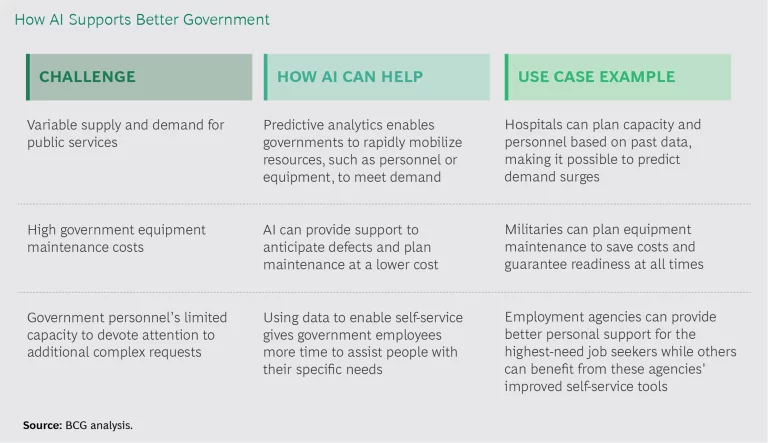The rapid development of artificial intelligence in recent years has generated solutions to many of the most pressing operational challenges governments face—and is now being used to combat a global health crisis .
Governments have used AI to manage budgets, detect fraud, and forecast and limit energy consumption. In addition to solving challenging problems, these AI solutions have the added benefit of providing data for evidence-based policymaking, which strengthens support for additional use cases and enables data-driven decision making. As the private sector’s groundbreaking AI investments and innovations mature, there is an even greater opportunity for the public sector to push the boundaries of how AI is applied.
But there is a big challenge. While a handful of governments have successfully used AI and digital technology to streamline, expand, and improve some services while lowering costs, most have been slow to pursue full digital transformations and lag behind rising “ AI-powered” companies . In the face of intense public scrutiny and the broader political process, government decision makers are cautious about pursuing big changes and the investments AI requires, especially in these times of rising budget deficits and fiscal uncertainty.
The global pandemic and ongoing economic crisis have created a unique opportunity. Government leaders have become more willing to consider broader process changes and—at least for the time being—are less resistant to adopting new technologies. Optimistically, the pandemic has created a once-in-a generation opportunity for leaders to push for bold institutional change . The coronavirus has left a permanent mark on societies, changing what people need and expect from their governments. Suddenly, the risk of doing nothing feels much greater than the risk of introducing new technology and processes. This has opened the window of opportunity for transformative change wider than it has been in decades, but that window could close just as quickly. Governments need to act immediately.
Suddenly, the risk of doing nothing feels much greater than the risk of introducing new technology and processes.
How AI Supports Better Government
As the pandemic rages on, individuals and businesses are turning to their city, regional, and national governments for answers to basic questions. Are there enough hospital beds, medical personnel, and supplies? Are we going to run out of food? How will I keep my workers employed? What makes a business essential? At the same time, governments have had to figure out how to keep delivering waste collection, public transportation, postal services, and other necessities people depend on—and how to do it all safely.
Deployment of AI-enabled tools during the pandemic has shown civil servants and policymakers the value of maintaining and expanding AI solutions to make internal operations more efficient and responsive to people’s needs. (See the exhibit.)
For example, the US Department of Health and Human Services is applying AI and automation to analyze procurement data to find costs savings, design better contracts, reduce buying time, and create visibility into the spending process across the agency. Singapore is using AI algorithms to analyze human resource and finance data, to address procurement requests and tender approvals, and to identify patterns that signal potential corruption. The country is also using machine learning and text analytics to categorize skills required for specific positions and to prioritize search results based on the relevance of an applicant’s skills.
E-government pioneers , such as Denmark, the UK, Estonia, Singapore, Australia, and New Zealand, are also using AI for scaling self-service tools and the personalization of services tied to life events such as having a baby and retirement. These AI initiatives are a good start, but there is much more that can be done. Governments aspiring to modernize the service experience have a lot to learn from the ways in which companies are applying machine learning and predictive analytics to improve the user experience.
Overcoming Resistance to Change
Achieving substantive change requires strong leadership and support for technological investment and adoption. While the opportunities for AI to significantly enhance the functions of government and the quality of its services are apparent, the barriers that have slowed the implementation of AI (and digital progress in general) remain in place.
Implementing AI requires significant investment to update legacy data and computing systems. Patience is also required, as the journey to scale AI-powered government is long and complex. Public servants are sometimes frustrated by the lack of progress of previous technology-based transformation initiatives. They must be reengaged.
Building better government for a brighter future demands difficult change management, and it requires rethinking organizational processes, recruiting and retraining civil servants, upgrading technology and tech skills, and understanding individuals’ needs and concerns. Furthermore, because cross-functional management is not standard in government, there is a natural tendency to focus on narrow AI use cases or limit applications to specific sectors that address immediate needs, especially during a crisis. A narrow focus makes it harder for leaders to engage an entire government in achieving ambitious goals. Leaders must be bold and think big. Failure to take a broad perspective will result in only partially capturing AI’s full value potential.
Leaders must be bold and think big. Failure to take a broad perspective will result in only partially capturing AI’s full value potential.
We suggest several strategies leaders can employ to overcome these barriers and risks:
- Set a clear vision. Government-wide AI adoption must start with a strong mandate. Senior leaders should clearly articulate a vision and strategy to ensure their own people, and many departments, are working in an organized and coordinated manner. Australia, Singapore, and the UK, for instance, have created dedicated digital agencies to communicate, coordinate, and execute whole-of-government digital transformation initiatives. Their activities include overseeing and promoting cross-functional collaborations, developing single-entry portals and microsites, driving digital services innovations, and technology upskilling for government employees.
- Start small, but think big. Leaders at any level who are advocating for large-scale change can build credibility and enthusiasm for their efforts by starting with small, high-impact pilot projects. Early experimentation can expose problems and provide leaders with opportunities to mitigate later resistance to new technologies and process changes. Leaders can use small pilot projects to make a big case for change, but this does not mean leaders need to maintain a small mindset. Often, it’s the initial steps that enable larger leaps later in the journey. For example, a North American government launched a pilot with data on testing capacity and the coronavirus’s progression. It built key performance indicators into a dashboard to track the health crisis and support decision making. This initiative has created a highly visible proof point that is motivating leaders to explore similar initiatives in other policy areas.
- Embrace a portfolio of options. There is limited time, talent, and budget to test every idea. When deciding on the projects to pursue, adopt a portfolio of options that balances quick wins (such as an automated business process) with transformational use cases that take longer to implement and return value (such as digitized unemployment claims and fraud detection). To identify the best use cases for experimentation, project leaders should consider several factors, including practical-implementation barriers, the potential applicability to related use cases, and the opportunity to reduce costs and leverage free resources.
- Ensure transparency and implement safeguards. Educating people, as well as building trust in the integrity and security of AI and data sharing, are essential components of successful government-wide AI adoption. For many people, AI is mysterious and raises privacy concerns. Both civil servants and the population they serve need to believe that data sharing can occur without compromising privacy. Establishing trust begins with an open and transparent dialogue as to why, where, and how AI will be used.
A BCG global survey of citizen perspectives on the use of AI in government showed strong support for adopting such technology in core decision-making processes, such as tax and welfare administration, and in the maintenance of public infrastructure. Citizens were not enthusiastic, however, about the use of AI in applications that involve highly sensitive personal data and decisions, such as parole boards and sentencing recommendations. Governments need to establish strict data protection and privacy safeguards, as well as high ethical standards, for AI adoption. For example, Singapore’s “Public Sector (Governance) Bill,” passed in January 2018, formalized agency data-sharing frameworks. It mandated the need to conduct regular audits, remove personal identifiers where appropriate, limit access to sensitive personal data, and introduced criminal punishments for data-related offenses.
Seize the Opportunity
A well-designed and trustworthy AI capability will enable public sector organizations to be better prepared for the recovery that lies ahead. Governments must seize the once-in-a-lifetime opportunity to extend their reach, reliability, and relevance through AI and digital technologies. The pandemic has created a unique situation in which government professionals can work together, and engage with the populations they serve, to support the use of AI and other technology to power change.
A well-designed and trustworthy AI capability will enable public sector organizations to be better prepared for the recovery that lies ahead.
Looking ahead, what is most important to remember is that AI has the potential to touch nearly every aspect of government. Those leaders who embrace this potential can set their nations or regions on a path toward a stronger economic recovery, societal healing, and the productive participation of government to achieve those goals and more.










